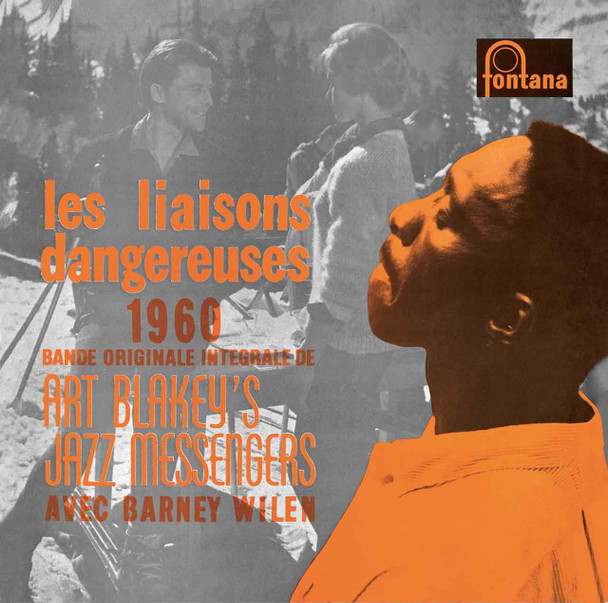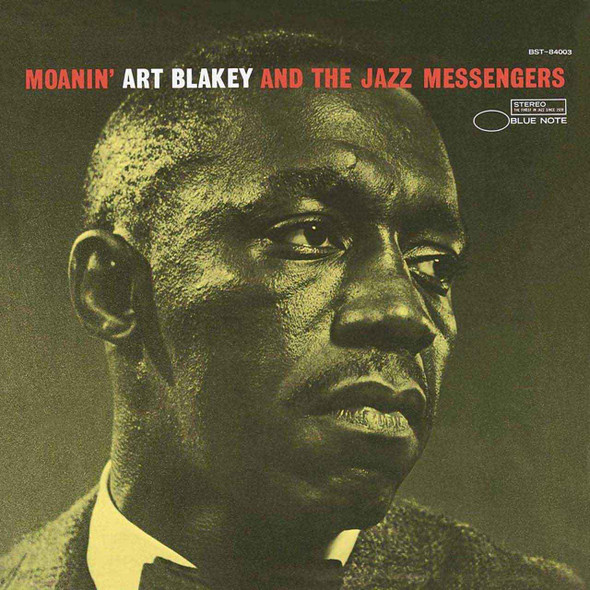Album Info
| Artist: | Art Blakey's Jazz Messengers Avec Barney Wilen |
| Album: | Les Liaisons Dangereuses 1960 |
| Released: | Europe, 2024 |
Tracklist:
| Bande Originale Du Film "Les Liaisons Dangereuses - 1960" | ||
| A1 | No Problem (1re Version) | 7:18 |
| Bass - Jimmy Merritt | ||
| Drums - Art Blakey | ||
| Music By - Jacques Marray | ||
| Piano - Bobby Timmons | ||
| Tenor Saxophone - Barney Wilen | ||
| trumpet - Lee Morgan | ||
| A2 | No Hay Problema | 4:32 |
| Bass - Jimmy Merritt | ||
| Drums - Art Blakey | ||
| Music By - Jacques Marray | ||
| Piano - Bobby Timmons | ||
| A3 | Prelude In Blue (À «L'Esquinade») | 6:53 |
| Bass - J. Merritt | ||
| Drums - Art Blakey | ||
| Music By - Jacques Marray | ||
| Piano - Duke Jordan | ||
| Soprano Saxophone - Barney Wilen | ||
| A4 | Valmontana (1re Version) | 5:42 |
| Bass - Jimmy Merritt | ||
| Drums - Art Blakey | ||
| Music By - Jacques Marray | ||
| Piano - Bobby Timmons | ||
| Tenor Saxophone - Barney Wilen | ||
| trumpet - Lee Morgan | ||
| B1 | Miguel's Party | 4:18 |
| Music By - Jacques Marray | ||
| B2 | Prelude In Blue (Chez Miguel) | 5:49 |
| Music By - Jacques Marray | ||
| B3 | No Problem (2e Version) | 5:55 |
| Music By - Jacques Marray | ||
| B4 | Weehawken Mad Pad | 1:48 |
| Music By - Jacques Marray | ||
| B5 | Valmontana (2e Version) | 4:30 |
| Music By - Jacques Marray |
Related Content:
Info About Buying Vinyl From Our Record Store
- We are a small independent record store located at 211 High St, Preston in Melbourne, Australia (North of Northcote, between Thornbury & Reservoir)
- We buy and sell new and used vinyl records - if you have a collection you'd like to sell please click here.
- We ship Australia wide for a flat rate of $10 for standard shipping or $15 for express post.
- Free Shipping for orders $150 and over.
- You can also pick up your order in store, just select Local Pickup at the checkout.
- We also ship internationally - prices vary depending on weight and location.
- We ship vinyls in thick, rigid carboard mailers with a crushable zone on either side, and for extra safety we bubble wrap the records.
- In stock vinyl is usally shipped next business day, please check the availability field at the top of the product page to see whether the record is currently in stock or if it is available from the supplier as well as estimated shipping times.
- If you order an in stock item together with a pre order or back order (listed as available from supplier rather than in stock) then the order will be shipped together when all items arrive. If you would like the in stock items shipped first please place two separate orders or contact us to arrange shipping items separately.
- We are strongly committed to customer satisfaction. If you experience any problems with your order contact us so we can rectify the situation. If the record arrives damaged or doesn't arrive we will cover the cost of replacing or returning the record.
- If you change your mind you have 30 days to return your record but you must cover the cost of returning it to the store.
- You can contact our Melbourne record shop at (03) 9939 3807 or at info@funkyduckvinyl.com
- Happy Listening!
Description
LP - Black Vinyl.
In choosing the Modern Jazz Quartet to play John Lewis’ music score for “Sait-on jamais,” Roger Vadim was among the first filmmakers to show (and prove) that on the screen, jazz was a musical language worthy of any other. So you might consider jazz as having a particular debt to Vadim for its future contributions to the 7th art, which
from then on would be closer and less episodic. Vadim’s film adaptation of the famous Laclos novel “Les Liaisons Dangereuses,” where the actors and characters were transposed to a contemporary setting, would give Vadim another opportunity to turn to jazz. Associated with Marcel Romano, who took charge of producing the recordings of titles selected in the United States, Vadim again showed his taste for associating his work in films with some of the most creative icons in modern jazz.
Art Blakey and his Jazz Messengers were among the latter of course, and this is the band we have chosen to present here, playing on the original recording from which the “Liaisons” soundtrack was created. The participation of the Jazz Messengers and Art Blakey is especially noticeable in the two scenes where the screenplay requires a real-
life musical presence. The first of these took place in the Megève night-club “L’Esquinade" during a New Year’s Eve dance; the second is the party scene at the end, where Valmont dies in a duel (Gérard Philippe played the role); here the musicians Kenny Dorham, Duke Jordan and Kenny Clarke are onscreen, and Barney Wilen separately, but none of the musicians can be heard: it is the Jazz Messengers who lend their voices you might say (via their instruments) to the famous part-time extras one sees in the film.
For the recording-sessions, Art Blakey summoned Barney Wilen (now back from the Newport Jazz Festival) to join the band. The results of their studio work were excellent beyond all expectations: the quality of the tapes, in fact, was so exceptional that Vadim was moved to use almost every take available to him... Mixing the music with the
film was a quite difficult task, but he accomplished it with some very skilful music editing that allowed listeners to savour snatches of all the four main themes that served as a basis for the Messengers’ performances on the soundtrack.
NO PROBLEM (in both its versions) accompanies numerous sequences in the party scene. Vadim liked the Afro-Cuban version so much that he decided to pick it up again for the final scene, which takes place in the corridors of the Palace of Justice, where Juliette (Jeanne Moreau) appears with burns disfiguring her face. VALMONTANA and MIGUEL'S PARTY were also used for the party at Miguel’s place, notably in the reconciliation
scene (brought about by Valmont) between Cécile (Jeanne Valérie) and Danceney (Jean-Louis Trintignant). PRELUDE IN BLUE (at the “Esquinade”) is the slow tempo number that Barney Wilen plays on soprano saxophone while Juliette and Valmont are dancing. This same theme is taken up at a fast clip during the party at Miguel’s.
After the statement of the theme, Lee Morgan plays a trumpet break to launch the party (with Kenny Dorham in close-up onscreen), and lead into the title WEEHAWKEN MAD PAD. As for NO HAY PROBLEMA, this is the South American version of NO PROBLEM, played solely on the piano with the rhythm section during the “Esquinade” scenes.
















